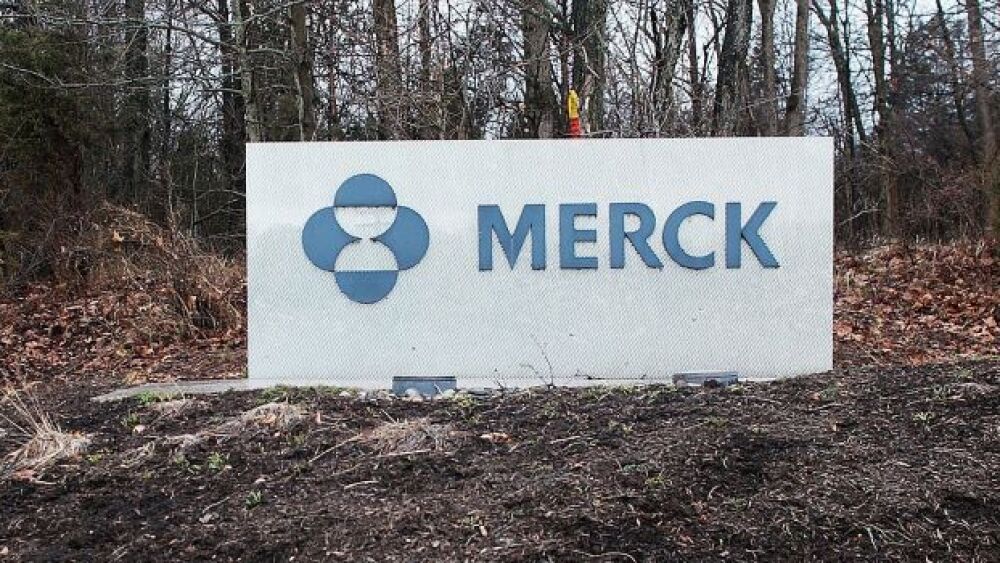Merck is in late-stage discussions to acquire Seagen for about $40 billion according to a Wall Street Journal report.
Chris Hondros/Getty Images
Merck is in late-stage discussions to acquire Seagen for about $40 billion, sources told The Wall Street Journal. Seagen is an appealing oncology target for Merck at a time when the latter is looking to bolster its cancer portfolio as mega-blockbuster Keytruda (pembrolizumab) teeters on the patent cliff.
The WSJ report suggests Merck is offering more than $200 per share and hopes to close the deal on or before its quarterly earnings report on July 28. On Wednesday, Seagen’s stock closed at $175.13 per share.
Rumors about the talks have been ongoing for several weeks. Seagen’s market cap is above $32 billion. In September 2020, the two companies inked a co-development pact to advance ladiratuzumab vedotin, a potential cancer therapy. Merck threw $600 million into the deal up front and acquired 5 million shares of Seagen stock for $1 billion. They also have a licensing deal for Tukysa in countries outside the U.S., Canada and Europe, for which Merck paid $125 million at the outset.
Merck’s Keytruda, an anti-PD-1 checkpoint inhibitor, brought in $7.2 billion last year alone. In Q1 this year, the drug raked in $4.7 billion, up 23% from last year over the same period. Keytruda will lose exclusivity in 2028. Last year it made up 35.2% of Merck’s total revenue.
Seagen’s focus is on antibody-drug conjugates (ADCs). These therapies link cancer-specific antibodies to cancer toxins. Its best-known drug is Adcetris.
Merck is one of the top oncology companies in the world but doesn’t have much of a focus on ADCs. Its market cap is $233 billion. In a note to investors in June, Wells Fargo analyst Mohit Bansal wrote, “The real value to MRK (Merck) is qualitative as SEGEN (Seagen) adds durability and diversity to the company beyond Keytruda,” according to Seeking Alpha.
If Merck and Seagen do close on a deal, they can expect regulators to take a close look. The U.S. Securities and Exchange Commission has increased its scrutiny of larger mergers and is taking a hard look at competing products, sometimes forcing companies to divest drugs before the deal is approved. As an example, in 2020, when AbbVie acquired Allergan, the SEC and other regulators required the companies to divest brazikumab and Zenpep (pancrelipase).
If they do manage to pull the deal together, it will be the largest life science M&A activity for the year to date. So far, the largest deal has been Pfizer’s acquisition of Biohaven for $11.6 billion.
It’s been a relatively quiet year, with M&A activity in the sector down 58% compared to the first half of 2021, with a valuation of $61.7 billion. In the first half of this year, there have been 137 deals, down 33% from the same period in 2021. Other deals include Bristol Myers Squibb’s acquisition of Turning Point Therapeutics for $4.1 billion, GSK’s takeover of Affinavax for $3.3 billion and Biocon Biologics’ acquisition of Viatris’ biosimilar portfolio and related commercial and operational capabilities for $3.3 billion.
There are numerous factors behind the slow M&A market, including ongoing supply chain problems, inflation, political uncertainty globally with the Russia-Ukraine war, and higher input costs, especially around packaging, due to inflationary pressures. Still, many biopharma companies have plenty of cash, especially if they have had any COVID-19-related products approved over the last two years.
A recent PwC report noted that “pharma is in a good position to combat this issue as most companies have plenty of cash on hand and can take more risks by purchasing early-stage assets. With capital becoming harder to come by for most biotechs, pharma is in a good position to acquire many of these companies at a discount from their highs of just a couple of years ago.”





